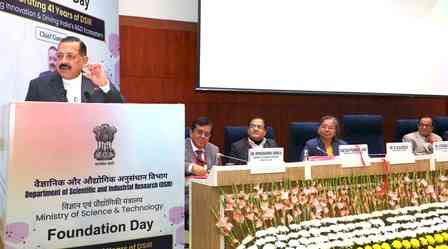LIC employees will observe one day nationwide strike on March 18
To protest against the decision of the government to list LIC in the stock markets through an IPO, increase FDI limits in the sector from 49% to 74%

Ludhiana: The employees and officers of LIC working in all the branches of Ludhiana Divisional Office will observe one day nationwide strike on 18th March 2021 to protest against the decision of the government to list LIC in the stock markets through an IPO, increase FDI limits in the sector from 49% to 74%. The strike has been called by All India Insurance Employees’ Association (AIIEA), Federation of LIC Class-1 officer’s Association, National Federation of Insurance Field workers of India (NFIFWI). All the Associations are opposed the proposals as these are not in the interest of the insurance industry, the Indian economy and the people.
This has been stated by Amarjit Singh, Divisional Secretary, All India Insurance Employees’ Association (AIIEA) and Sanjeev Sood, Federation of LIC Class-1 Officers’ Association in a statement here today. They further said:
No Justification for LIC IPO:
The LIC was created through an Act of Parliament. It was given the task of raising resources for faster industrialization of the country by collecting small savings in the form of premiums while giving utmost security to the policyholders. The LIC has been very successful in meeting these objectives. The disinvestment in LIC is the first step towards privatization. Therefore LIC IPO violates the very objectives of its creation.
The capital invested by the government in LIC in 1956 was a meager Rs.5 crore. This was increased to Rs.100 crore in year 2011 to meet the regulatory requirements. On this small capital, LIC has assets under management amounting to Rs.32 lakh crore as at 31.3.2020. It has 30 crore individual policyholders and another 12 crore have been insured under group schemes. The LIC has given utmost importance to the needs of the weaker sections of the society. It has insured 3.68 crore people under various social security schemes for the year 2019-20. The LIC holds the distinction for the best claim settlement performance. For the year 2019-20, it settled 2.16 crore claims for Rs.1,59,769 crore. Under the social security schemes, it settled 68,352 claims amounting to Rs.901.95 crore during the same period.
Its total investments in the Indian economy amount to an astronomical figure of Rs.30.70 lakh crore. It promotes social welfare through investments in infrastructure and social sectors like generation and transmission of power, housing, water supply and sewerage, building of roads, bridges, road transport and railways. Its total investments in infrastructure and social sector and government securities both Central and State amount to Rs.24 lakh crore. The LIC has been consistently paying high dividends to the government on its paltry investment. The cumulative dividend paid by LIC since 1956 is over Rs.28000 crore and for the year 2019-20, it paid dividend amounting to Rs.2698 crore.
The LIC IPO will severely impact the economy and vulnerable sections of the Indian people. The objectives of nationalisation will recede into background and LIC will have to concentrate on delivering increasing profits to the shareholders. The LIC like the private companies have to target the big policies which bring greater profits. In the process the small size policies which the poor, vulnerable and lower middle classes purchase will no more be attractive. The social objective of providing insurance cover to the weaker sections will receive a set-back. The aim to expand insurance in the unprofitable rural areas too will suffer. Therefore, disturbing the character of LIC will harm the interests of the national economy and the poorer sections of the Indian population.
No need to Increase FDI Limit:
The government has proposed to increase FDI in insurance sector from 49 to 74 per cent and has decided to allow even foreign ownership in insurance company.
The argument for FDI hike is that insurance is a capital intensive business. The development and expansion of insurance requires significant amount of capital, which the Indian partners are not capable of doing. This is not true. All the big corporate houses of India have entered the insurance business and capital has never been an issue with them. Most of these business houses have been investing heavily outside the country for expansion of their interests. Therefore, it is not possible to accept that they lack resources for expansion. Some of them are also listed and have access to raise capital through the markets in India.
The second argument is that insurance in India still remains under penetrated. Penetration is seen as premiums collected in relation to the GDP. In a country which has a low per capita income and people lack adequate resources to save, looking at the insurance market from this angle is not entirely right. It is estimated that nearly 40 crore Indians are insured both through individual assurances and Group insurance. It is estimated that the insurable population (Persons who can be insured) in India is around 60 crore. Therefore the numbers of persons covered are significant. This number can increase depending upon the rising levels of income and savings.
Insurance, especially life insurance, mobilises small savings of the people and converts them into capital for long term investments in social and infrastructure projects. It is therefore imprudent to allow foreign capital greater access to and control over domestic savings. It is important that in a developing economy like ours, the state exercises greater control over domestic savings. Allowing foreign capital greater control over domestic savings would surely harm the nation. In a country which has scarcity of capital, it is imprudent to allow the foreign capital to control the household savings. The experience worldwide has proved that foreign capital can never be a substitute for capital formation through domestic savings.
The AIIEA has been mobilizing public opinion against the decisions of the government. It has urged the government to reconsider these decisions in national interests. The AIIEA has met over 450 MPs to inform them of the inherent dangers to the national economy. The AIIEA requests the people of India to extend solidarity with the LIC employees strike on 18th March 2021 and support the campaign against LIC IPO, FDI hike and privatization of Banks and general insurance company.


 cityairnews
cityairnews 










